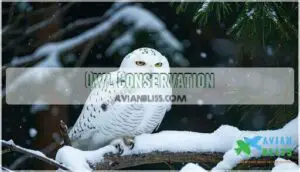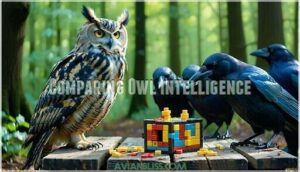This site is supported by our readers. We may earn a commission, at no cost to you, if you purchase through links.

While they lack the problem-solving abilities of ravens or parrots, owls excel in specialized intelligence.
Their brains are finely tuned for hunting, with exceptional spatial memory that helps them navigate in darkness and pinpoint prey locations.
They can recognize patterns, adapt hunting strategies to different environments, and some species even use tools.
However, their intelligence is more like having a high-powered laser versus a Swiss Army knife – incredibly precise but narrowly focused.
Unlike social birds that develop complex communication skills, owls invest their cognitive resources in stealth and precision hunting techniques that have kept them successful predators for millions of years.
Table Of Contents
Key Takeaways
- You’ll find owls have specialized intelligence rather than general smarts – they excel at hunting-specific skills like spatial memory and sound localization but can’t match crows or parrots in problem-solving tests
- Their brains are built like high-powered lasers, not Swiss Army knives – owls invest cognitive resources in stealth and precision hunting techniques instead of developing broad intellectual abilities like social birds
- You’re witnessing remarkable sensory processing when owls hunt – their asymmetrical ears create 3D sound maps, their eyes are 100 times more sensitive to low light than yours, and specialized feathers enable silent flight
- You shouldn’t expect owl intelligence to work like human smarts – their cognitive abilities perfectly match their nocturnal predator lifestyle, proving that different types of intelligence serve different survival purposes in nature
Are Owls Smart?
You’ve probably wondered if those big-eyed night hunters are actually smart or just lucky predators. Owl intelligence goes far beyond basic instincts, showcasing impressive owl cognitive abilities that’ll surprise you.
These birds demonstrate genuine owl problemsolving skills when traversing complex hunting scenarios and adapting to new environments.
Owl cognition relies heavily on specialized brain structure shaped by evolutionary pressures. Their remarkable sensory adaptations – those dish-shaped faces and asymmetrical ears – work alongside cognitive processing to create sophisticated hunting strategies.
You’ll find owls recognizing individual humans, learning from their parents through extended training periods, and even showing curiosity about unfamiliar objects. Like ducks, they also show adaptability in foraging when environmental conditions change.
While avian cognition research shows crows might edge out owls in some intelligence tests, owls excel in their specialized niche. Their owl hunting skills combine instinct with learned behaviors, proving these silent predators possess genuine intelligence rather than just hardwired responses.
Owl Senses and Intelligence
When you watch an owl hunt, you’re witnessing a creature with senses so sharp they seem almost supernatural.
Their extraordinary hearing and vision don’t just make them deadly predators—they reveal a form of intelligence perfectly adapted to their world.
Keen Senses for Hunting
While owls aren’t the brainiacs many believe them to be, they’re absolute masters in the area of hunting through their incredible sensory abilities.
Their hunting prowess stems from four remarkable adaptations:
- Binocular Vision: Eyes nearly 100 times more sensitive to low light than yours, with forward-facing placement for perfect depth perception
- Auditory Mapping: Asymmetrical ear placement creates precise 3D sound maps, pinpointing prey beneath snow or foliage
- Facial Discs: Act like satellite dishes, channeling sound waves directly to their ears for enhanced prey localization
- Silent Flight: Specialized feathers muffle wing beats, allowing undetected approaches during hunting strategies
This sensory perception gives owls their edge.
Their brains prioritize processing these inputs rather than complex problem-solving, making them specialized predators perfectly adapted for darkness.
Their plumage aids silent flight by dampening air turbulence.
Curiosity and Recognition
Beyond their hunting prowess, you’ll find that owl intelligence manifests through remarkable curiosity and recognition abilities. These cognitive abilities reveal sophisticated animal intelligence that challenges common assumptions about avian smarts.
Owls prove that intelligence isn’t just about puzzles—it’s about mastering your world with remarkable precision.
Owls demonstrate impressive individual learning through their responses to novel environments. When captive behavior studies introduce new objects, owls show genuine novelty response—investigating unfamiliar items with focused attention. Their owl learning capacity extends to recognizing different people, distinguishing between familiar caretakers and strangers through visual and auditory social cues.
Young owls showcase extensive owl problem solving during their six-month apprenticeship with parents. This extended learning period allows them to develop critical survival skills through observation and practice. Barn owl chicks even experience supplemental REM sleep, suggesting their brains actively process new information during development.
Consider these fascinating aspects of owl cognition:
- They remember individual human faces and voices
- Young owls practice hunting techniques like children learning sports
- They adapt their behavior based on environmental changes
- Captive owls develop unique personalities and preferences
- Their curiosity drives exploration of new territories and food sources
This combination of recognition skills and inquisitive nature demonstrates that owl intelligence operates differently than corvid cognition, but remains remarkably sophisticated.
Owl Behavior
Moving beyond their remarkable senses, you’ll discover that owl behavior reveals their specialized nature.
These opportunistic predators showcase fascinating hunting strategies and nesting habits that demonstrate practical intelligence rather than complex problem-solving skills.
Owl behavior patterns reflect their evolutionary focus on survival efficiency:
- Vocalizations serve territorial communication and mating rituals
- Burrowing owls collect dung to attract beetle prey
- Nesting habits include decorating burrows with shiny trinkets
- Urban adaptation shows behavioral flexibility
While owl cognition differs from corvids, their social behavior and owl learning abilities shine through hunting success.
You won’t find them using tools like crows, but their specialized behaviors work perfectly for their ecological niche.
Owl intelligence manifests through instinctual behaviors honed over millions of years rather than creative thinking.
Owl Symbolism
Throughout history, you’ve likely encountered owls as symbols of wisdom, but their cultural significance extends far beyond this popular association.
Owl symbolism varies dramatically across cultures, creating a fascinating tapestry of mythological interpretations that continues evolving today.
Ancient Greeks established the foundation for wisdom symbolism by linking owls to Athena, goddess of knowledge.
However, cultural perceptions tell different stories worldwide.
While Romans connected owls to prophecy through Minerva, many Native American tribes viewed them as messengers of death.
Folklore variations show striking contrasts—Japanese culture embraces owls as good luck charms, while some Indian cultures associate them with foolishness rather than intelligence.
This symbolic evolution reflects changing human relationships with these nocturnal hunters:
- Artistic depictions in medieval Europe linked owls to witchcraft and persecution
- Modern Western spiritualism transformed them into symbols of wealth and protection
- Literature popularized whimsical owl characters in children’s stories
- Contemporary mythology positions owls as therapeutic symbols for overcoming fears
These diverse cultural symbolism patterns reveal more about human imagination than actual owl intelligence.
Owl Conservation
Wildlife faces unprecedented challenges today, and owls aren’t immune to these pressures. These magnificent nocturnal hunters need our help more than ever.
Modern threats are reshaping owl populations worldwide. Habitat Loss destroys their natural hunting grounds as forests become shopping centers and prairies turn into subdivisions. Climate Change shifts prey patterns and nesting cycles, forcing owls to adapt quickly or perish. Meanwhile, Poaching Threats target certain species for illegal wildlife trade.
The good news? Conservation Efforts are making real progress:
- Protected habitat creation preserves critical nesting areas
- Research programs study owl intelligence and cognitive abilities to improve protection strategies
- Citizen science projects engage communities in owl research
- Educational initiatives boost Public Awareness about these remarkable birds.
Scientists studying bird intelligence have discovered that understanding owl conservation requires appreciating their unique cognitive abilities. Supporting owl conservation products can also contribute to these efforts. Each species plays a key ecological role as apex predators, controlling rodent populations and maintaining ecosystem balance.
Comparing Owl Intelligence
You might expect owls to be brilliant, but their intelligence compared to other birds tells a different story.
While they’re skilled hunters, owls actually fall behind crows, parrots, and even some smaller birds in terms of problem-solving abilities.
Owl Characteristics
When comparing owl intelligence to other birds, you’ll find owls occupy a unique niche.
Owls master their hunting niche through specialized skills, not general intelligence like crows or parrots.
Their cognitive abilities focus on specialized hunting rather than general problem-solving. While owl intelligence isn’t as broad as corvids’, their owl behavior showcases remarkable owl adaptation for survival.
Owl sensory perception drives their success through:
- Silent Flight enabled by specialized Feather Adaptations
- Facial Discs that funnel sound for precise prey location
- Nocturnal Hunters with exceptional low-light vision
- Owl Pellets revealing dietary analysis and territorial habits
These adaptations make owls incredibly efficient predators, even if they struggle with puzzle-solving tasks that corvids master easily.
Intelligence in Crows
Crows possess remarkable cognitive abilities that far exceed most birds, including owls.
These corvids demonstrate sophisticated problem-solving skills through complex tool use, creating hooks from twigs to extract insects.
Their crow brains excel at:
- Advanced tool use: They craft and modify tools for specific tasks
- Complex problem solving: Multi-step puzzles are solved with 80% success rates
- Social learning: Face recognition lasts up to 17 years, with grudge-holding abilities
Crows display abstract reasoning, recursive thinking, and even count aloud like toddlers.
Crows can also vocalize numeric values, an ability previously undocumented in non-human animals.
Their bird intelligence surpasses owl intelligence in comparative studies, making corvids the standout performers in avian cognitive abilities.
Intelligence in Other Birds
Beyond corvid cognition, several bird species showcase remarkable avian intelligence that surpasses owl capabilities.
African Grey Parrots demonstrate parrot smarts through sophisticated vocal learning and problem-solving abilities that rival young children’s cognitive skills. These bird brains process information with neural densities exceeding primates of similar brain size.
- Tool mastery: Woodpecker finches craft cactus spine tools for insect extraction
- Social learning: Great tits transmit foraging techniques across generations through cultural transmission
- Comparative intelligence: Kea parrots solve multi-step problems three times faster than corvids
Bird intelligence varies dramatically across species, with social, omnivorous birds typically excelling in avian problem-solving tasks that require flexibility and adaptation.
Measuring Intelligence
When you think about measuring animal intelligence, you’re actually tackling one of science’s trickiest puzzles.
Researchers use various tests like problem-solving tasks, memory challenges, and tool-use experiments, but defining what counts as "smart" gets complicated when comparing a night-hunting owl to a social crow or puzzle-solving parrot.
Defining Intelligence
Understanding what makes an animal "smart" isn’t as straightforward as you might think.
Animal cognition researchers have moved beyond simple definitions to examine specific cognitive abilities that help species survive and thrive in their environments.
When you’re evaluating avian intelligence, you’ll want to examine these key areas:
- Problem-solving capacity – How well birds tackle novel challenges and devise creative solutions to obtain food or avoid predators
- Learning capacity – The ability to acquire new information, modify behavior based on experience, and apply knowledge to different situations
- Sensory perception integration – How effectively birds process and combine information from multiple senses to make decisions
Comparative intelligence studies reveal that adaptive behavior varies dramatically across bird species.
While owl intelligence research shows they excel at specialized hunting skills and spatial awareness, they don’t match corvids’ flexible problem-solving abilities.
This doesn’t make owls "dumb" – their cognitive abilities perfectly match their ecological niche as nocturnal predators.
Some species, like crows, even use innovative feeding strategies.
Factors in Species Success
Measuring owl intelligence against species success reveals that cognitive abilities aren’t everything.
While owl brain size varies among owl species, their triumph comes from specialized adaptations rather than raw smarts.
These nocturnal hunters have mastered their niche through:
- Silent flight mechanics that catch prey off-guard
- Exceptional night vision surpassing most predators
- Precise hearing for three-dimensional sound mapping
- Flexible hunting strategies across diverse habitats
Adaptability Factors and Resource Availability matter more than problem-solving prowess.
Environmental Impact shapes survival, while Reproductive Rates and Genetic Diversity influence long-term persistence.
Owl behavior demonstrates that specialized intelligence often trumps general cognitive abilities in nature’s success game.
Frequently Asked Questions (FAQs)
Are owls intelligent birds?
You’ll find owls are moderately intelligent birds with specialized skills. They excel at hunting through advanced sensory processing and problem-solving, but lag behind crows and parrots in general cognitive tests.
Are owls smart?
Picture those piercing yellow eyes scanning the darkness—you’re witnessing specialized intelligence at work.
Owls aren’t traditionally "smart" like crows, but they’re brilliantly adapted hunters with excellent problem-solving skills for survival.
Are Night Owls smart?
You’re generally sharper and more creative than morning people. Research shows night owls score higher on intelligence tests, exhibit better problem-solving skills, and demonstrate greater cognitive flexibility than early risers.
Are barn owls smart?
Barn owls aren’t exceptionally smart compared to crows or parrots, but they’re cleverly adapted hunters.
You’ll find they excel at sound-based navigation and show decent problem-solving skills for survival rather than complex reasoning, making them decent at navigating their environment.
Are owls the smartest bird species?
Absolutely not – crows and ravens completely demolish owls in intelligence.
You’ll find corvids, parrots, and even pigeons consistently outperform owls on cognitive tests, problem-solving tasks, and complex behaviors that truly showcase avian brilliance.
Are owls wise?
Owls aren’t inherently wise—that’s just Western symbolism from Greek mythology linking them to Athena.
While they’re skilled hunters with impressive sensory abilities, they don’t match crows or parrots in problem-solving intelligence.
Can an owl pick up a 10 lb cat?
Like asking your grandfather if he can still benchpress a Buick, you’d be surprised.
Great Horned Owls can lift about five pounds maximum, so your 10-pound cat won’t become an aerial passenger.
Do owls stare at humans?
Yes, you’ll notice owls staring directly at you when they spot you.
Their forward-facing eyes and inability to move them in their sockets means they must turn their entire head to track you, creating that intense, unblinking stare.
How intelligent is an owl?
Remarkably, barn owls achieve up to 85% hunting success rates, outperforming most raptors.
You’ll find owls possess specialized intelligence for survival rather than general problem-solving.
They excel at sound localization and adaptive hunting but struggle with tasks crows easily master.
Why do people think owls are wise?
Ancient Greek culture linked owls to Athena, the goddess of wisdom and knowledge.
You’ve inherited this symbolic association through Western tradition, even though owl intelligence actually varies substantially across species and contexts, which is linked to the idea of wisdom.
Conclusion
Picture a silent hunter gliding through moonlit branches, perfectly adapted for its nocturnal world.
So are owls smart? They possess specialized intelligence that’s remarkably different from other birds.
While they can’t solve complex puzzles like ravens, you’ll find their cognitive abilities perfectly match their hunting lifestyle.
Their brains excel at spatial memory, pattern recognition, and precision targeting.
This focused intelligence has made owls successful predators for millions of years, proving that different types of smarts serve different purposes in nature.
- https://bioneers.org/what-an-owl-knows-rethinking-bird-brains-intelligence-ze0z2502/
- https://www.mentalfloss.com/article/69941/are-owls-actually-wise
- https://www.10000birds.com/ask-a-birder-are-owls-wise.htm
- https://a-z-animals.com/blog/how-smart-and-wise-are-owls-everything-we-know-about-their-intelligence/
- https://birdfact.com/articles/are-owls-smart









